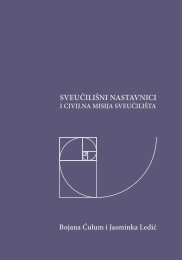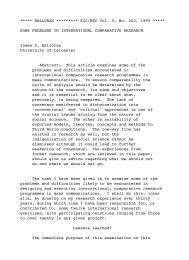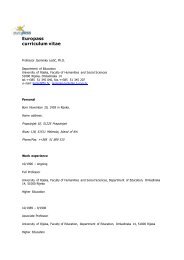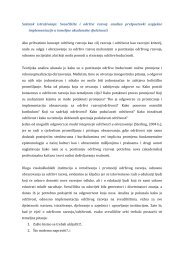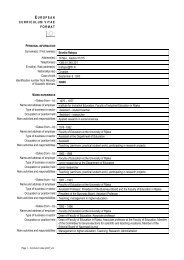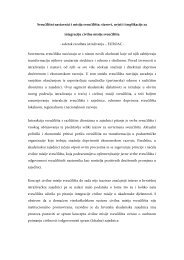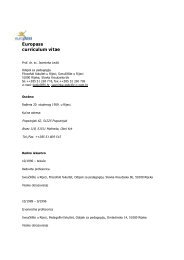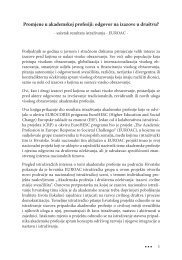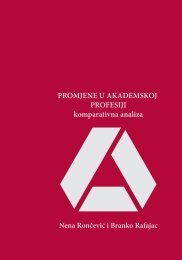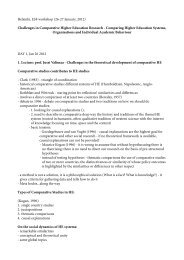Plan_RHESI Data Analysis Workshop - euroac
Plan_RHESI Data Analysis Workshop - euroac
Plan_RHESI Data Analysis Workshop - euroac
You also want an ePaper? Increase the reach of your titles
YUMPU automatically turns print PDFs into web optimized ePapers that Google loves.
Jochen and Grit 14 February 2011<br />
<strong>RHESI</strong> workshop<br />
“<strong>Analysis</strong> of Case Study <strong>Data</strong> and Interview <strong>Data</strong>”<br />
To be held in Lugano, 21-22 February 2011<br />
Location: University of Lugano, Room 215<br />
<strong>Plan</strong>:<br />
Monday 21 st February<br />
9.00 -13.00<br />
Part I Case study analysis<br />
This session will address the strategies that can be applied in the analysis of<br />
qualitative case study data. How can qualitative data be used to answer theoretical<br />
research questions, i.e. to arrive at explanations of classes of phenomena (rather than<br />
the observed situations and processes)? What strategies of data analysis exist, what<br />
are their advantages and disadvantages? How can building typologies, process<br />
tracing, or Ragin’s Qualitative Comparative <strong>Analysis</strong> be employed in the analysis of<br />
case study data?<br />
Specific questions for discussion:<br />
- For guests: What is the aim of your project? What needs to be achieved by the<br />
analysis of qualitative data?<br />
- For <strong>RHESI</strong>s: Could we encounter the mechanisms of a self-fulfilling prophecy in<br />
<strong>RHESI</strong>? If so: in what process?<br />
- For both: What are your previous experiences with qualitative data analysis? What<br />
did you do, what went well, what went not so well?<br />
14.00-18.00<br />
Part II: Presentation and Demonstration of data analysis methods: Coding and Qualitative<br />
content analysis<br />
This session will introduce participants to the by far most common method of the<br />
‘first stage handling’ of qualitative data – coding - and to one alternative – qualitative<br />
content analysis. The presentation and demonstration of the two methods include<br />
methodological foundations, conditions of use (necessary properties of the data,<br />
software support), the outcome produced by these methods.<br />
Tuesday 22 nd February<br />
Part III Training<br />
The training will provide participants with hands-on experience in one or both of the<br />
methods by providing them with a text that will be analysed. There will be<br />
independent modules, which will give participants the opportunity to switch or to<br />
continue with their preferred method.<br />
9.00-11.00<br />
1
First parallel training sessions on qualitative content analysis and coding<br />
11.30-12.30<br />
Short presentations and joint discussion of advantages and problems of both<br />
methods<br />
13.30-15.30<br />
Second parallel training sessions on qualitative content analysis and coding<br />
16.00-17.00<br />
Short presentations and joint discussion of advantages and problems of both<br />
methods<br />
17.00-18.00<br />
<strong>Plan</strong>s: How can we achieve a compatible data analysis in the IPs?<br />
Note on Lunch and Coffee: We are on our own here (self-organized and self-paid)<br />
because this is not a EuroHESC workshop)<br />
Preparation:<br />
1. Read the paper.<br />
2. Think about the questions for the first morning.<br />
3. Install the demo version of Atlas/ti on your laptop – available at<br />
http://www.atlasti.com/demo.html<br />
Mac users: unfortunately, Atlas/ti requires a windows environment. See<br />
http://www.atlasti.com/mac.html for advice.<br />
4. Bring your Laptop. People who don’t have one: doesn’t matter, we can work<br />
around this.<br />
2



